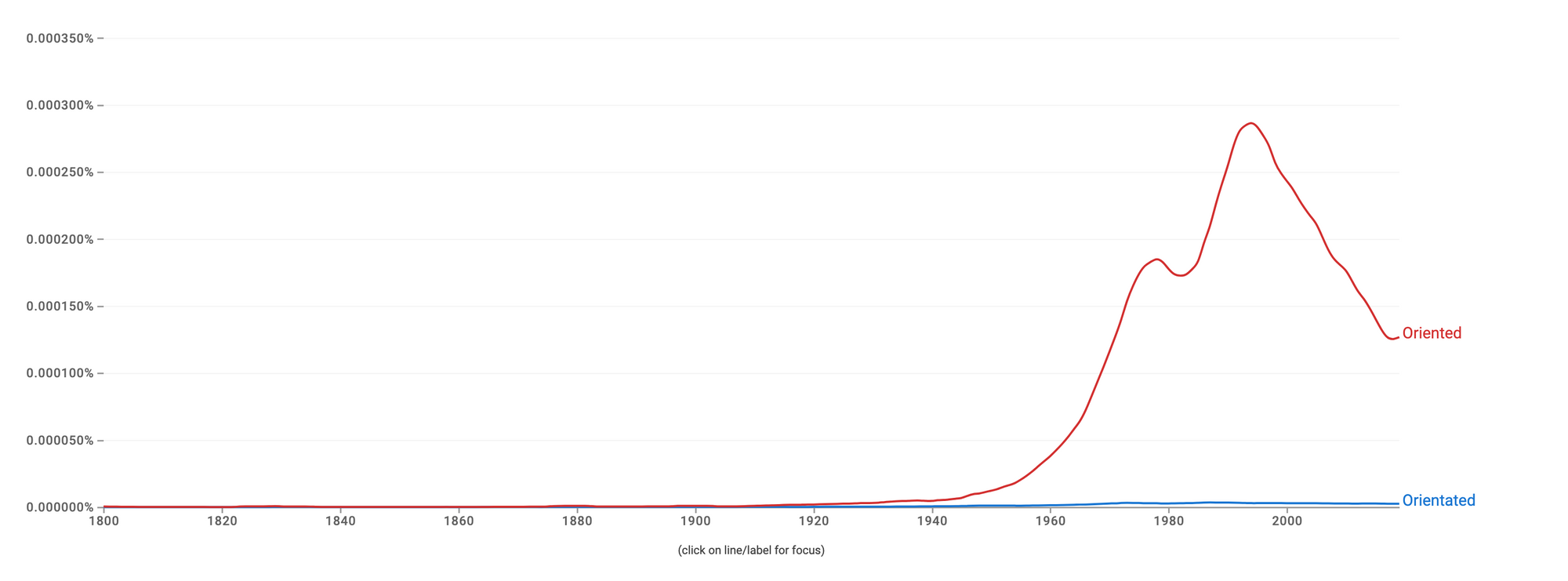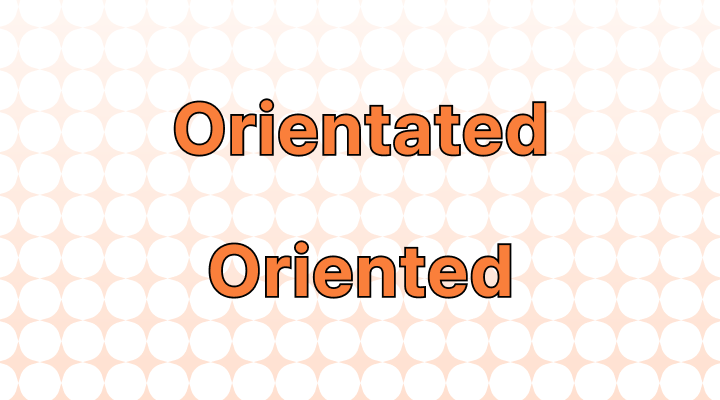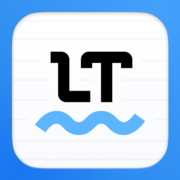"Orientated" and "oriented" are virtually synonymous terms, differing primarily in their regional usage. "Orientated" is more commonly employed in British English, while "oriented" is the preferred choice in American English. Both words refer to the act of aligning, adapting, or directing something or someone toward a specific position, direction, or goal.
In the world of English usage and grammar, tiny differences can make a world of difference. Case in point: "Orientated" and "Oriented." These two words, which appear almost identical at first glance, have a subtle yet important distinction in meaning and usage.
In the below graph, you can see that the word orientated is less popular than the word oriented. This is because of the regional usage of orientated, which you will learn more about later on in the blogpost. So, keep on reading to find out more!

In this blog post, we'll delve into the definitions of both terms, explore common idioms and phrases related to them, provide synonyms to expand your vocabulary, and offer practice questions to reinforce your understanding.
Oriented
The word "oriented" is a past participle form of the verb "orient," which means to align, adapt, or adjust something to a specific position or direction. In a broader context, it can also refer to the act of aligning oneself or others with a particular focus or goal. For example, "she is oriented toward a career in science."
Orient as a noun
As a noun, "orient" refers to the East, the direction in which the sun rises. This term is often used in a geographical or navigational context, especially in older texts and poetry. For instance, sailors would use the "orient" to find their way on the open sea, and it was a vital point of reference for travelers in ancient times. The word "orient" can also have cultural and metaphorical connotations, as it has been historically associated with the idea of the East as a source of enlightenment and knowledge. In modern usage, while "orient" as a noun is less common than its use as a verb, it still carries a sense of direction and holds a place in literature and cultural references.
Orientated
While "oriented" is more common in American English, "orientated" is used predominantly in British English. It has the same meaning as "oriented." Therefore, if you are accustomed to British English, you might say, "He is orientated towards traditional values."
Keep in mind that the root word 'orientate' is a valid word solely when functioning as a verb. It cannot substitute for the noun 'orient'.
Common Idioms/Phrases:
- Get Oriented: To become familiar with a new environment, situation, or task. Example: "It might take me a few days to get oriented in this new job."
- Lost and Oriented: This playful twist on "lost and confused" suggests a sense of direction or purpose amid a chaotic situation. Example: "Even in the middle of the bustling city, she never felt lost and oriented herself with ease."
Synonyms:
- Oriented: aligned, adjusted, adapted, directed, positioned, attuned
- Orientated: aligned, adjusted, adapted, directed, positioned, attuned
More example sentences
- She quickly oriented/orientated herself to the fast-paced city life.
- In his new role, he needs to become oriented/orientated to the company's core values.
- The GPS oriented/orientated us toward the nearest gas station.
- Their team is well-oriented/orientated towards achieving their project goals.
- I need some time to oriented/orientated myself to this unfamiliar culture.
While "oriented" is the more widely accepted term in American English, "orientated" is its British counterpart. Both words mean the same thing and involve aligning or adapting to a specific direction or focus. Understanding the differences between these two words, along with mastering the common idioms and synonyms associated with them, will enhance your language skills and make your communication more precise, regardless of which English variant you prefer. Happy writing!
Want to sound like a native speaker?
Engram’s AI-powered grammar checker makes your English sound like a native speaker’s, suggesting natural English expressions on top of fixing grammar, spelling, punctuation, word order, and vocabulary.















